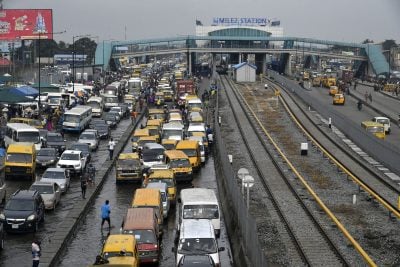The first meeting between new US President Joe Biden and African leaders, held virtually at the start of February during the 34th African Union Summit, took place at a time when geopolitical tectonic plates are rapidly shifting. Africa has become a subject of mounting interest, exemplified by the ‘vaccine diplomacy’ occurring now on the world stage.
The summit presented Biden the opportunity to re-engage with Africa as the region’s growth and investment prospects brighten and to reaffirm Washington’s commitment to the rules-based international order. Africa will become the leading driver of global growth in the coming decades, sustained by the world’s youngest workforce, as well as improved competitiveness and productivity in the context of expanding economies of scale under the African Continental Free Trade Area (AfCFTA) agreement.
If Biden is to tilt the balance of power back in the US’s favor, he will need Africa on his side. Given his extensive experience with the region, and having championed the end of apartheid decades ago, he is well-positioned to do so.
During his first meeting, Biden emphasised the ongoing battle against Covid-19 as one of the most serious challenges facing the continent. Although the damage wrought in Africa by the virus has been less severe than in other parts of the world – with hard-hit South Africa being the key exception – the region’s fragile health systems are at breaking point. The crisis is threatening to reverse gains made over the last few decades.
In the absence of formal social safety nets, lockdowns and border closures wiped out revenue flows and increased poverty rates in a region that relies heavily on informal coping mechanisms. According to the United Nations, global poverty is now set to rise for the first time in decades. Africa, which accounts for the lion’s share of the world’s poor, is expected to bear the brunt.
Several factors have contributed to the heightening of balance of payment pressures and liquidity constraints in Africa, including: the twin global demand and supply shocks; the sharp fall in commodity prices; dramatic declines in tourism revenues and remittances; and massive capital outflows.
Africa will not return to pre-pandemic growth levels before 2022
The World Bank projects a 20% drop in remittances to low- and middle-income countries, including an even worse decline for Africa, amounting to more than $100bn in inflows. According to forecasts from the International Institute of Finance, capital flows – which dried up at the heigh of the pandemic downturn – will not return to pre-crisis trend growth before 2022.
Many countries continue to experience severe liquidity shortages, especially tourism-dependent economies, and low-income states without access to capital markets. The absence of timely and effective support could magnify the scale of countries’ financing challenges, with liquidity crises potentially morphing into solvency crises triggering a cascade of defaults that could threaten global financial stability.
Following the outbreak of the Covid-19 pandemic, experts advocated the issuance of additional special drawing rights (SDRs), the International Monetary Fund’s (IMF) composite currency unit, based on a basket of leading currencies. This would be the most cost-effective, unconditional, countercyclical, and low-risk response to the downturn, and would inject liquidity indiscriminately into the global economy and ease balance of payment pressures. Almost a year into the crisis, the issuance of new SDRs remains central to the global economy’s recovery, which could be delayed either by vaccine nationalism or liquidity constraints that impede low-income countries from acquiring vaccines.
The issuance of new SDRs was endorsed by most IMF member countries but blocked by the USA
The issuance of new SDRs was endorsed by most countries but blocked by the US, which has a controlling vote at the IMF. A show of support from the Biden administration would almost certainly pave the way for an instantaneous increase in the level of foreign exchange reserves of all IMF member countries. There besides, it would give a necessary confidence boost for a synchronized global recovery benefiting developed and developing economies alike. The former could use their SDR allocations to ease domestic fiscal pressures and leave them with more resources for international aid. The latter could draw on greater fiscal space and purchasing power associated with increasing foreign reserves to support the recovery process.
Evidence shows that the marginal effects of such a move will be especially significant for developing economies, not only in terms of risk mitigation, but also from the standpoint of macroeconomic management and growth. Under the issuance of $653bn of new SDRs – the maximum threshold that does not require explicit congressional approval – African countries would collectively receive around $46bn.
This allocation would represent a 13% boost to their combined international reserves. For DSSI-eligible low-income nations in Africa, the boost would be about 21%, in part because IMF quotas are tilted towards low- and middle-income countries relative to their share of global GDP. This would expand countries’ fiscal space and strengthening their capacity to address immediate as well as long-term needs arising from the Covid-19 crisis. These could encompass purchasing vaccine doses, boosting the recovery process through countercyclical fiscal support, or repaying debts to external creditors to buttress global financial stability.
Furthermore, SDRs will greatly complement the G20’s Debt Service Suspension Initiative (DSSI). The DSSI – which offers relief on official bilateral debt services to 73 low-income countries, including 37 from Africa, though not all eligible nations are participating – has been characterized as insufficient given the scale of the current account deficit created by the pandemic downturn. This is doubly true for Africa, given that economic livelihoods in the region depend heavily on trade, both formal and informal. But issuing new SDRs would act as a financial multiplier, increasing the fiscal space in the short term and fortifying prospects for financial soundness and global stability in the medium and long term.
SDR issuance would reduce countries’ exposure to exchange rate volatility and liquidity constraints associated with elevated balance of payment pressures. Besides preventing liquidity crises from morphing into solvency crises, deploying additional SDRs would sustain investor confidence and strengthen Africa’s economic recovery.
But the development impact of such a move would be broad-based and longer-lasting. It will benefit low-income, DSSI-eligible African countries as well as those larger nations, like Nigeria and Kenya, that opted out of the G20 initiative to preserve access to international capital markets, and which will play a key role in the region’s recovery as major drivers of intra-African trade. These, as well as other larger African economies, most notably Egypt and South Africa, do not have access to the full menu of options deployed to increase global liquidity and enhance financial stability during periods of peak strain in global dollar funding markets. This includes the swap arrangements extended by the Federal Reserve to some countries and temporary repo facility for foreign and international monetary authorities.
The daunting risks facing Africa and the rest of the world make the issuance of additional SDRs even more urgent. Beyond providing a timely shot in the arm of the global economy’s incipient recovery, new SDRs will also help advance the implementation of the AfCFTA. This will involve bolstering investment in infrastructure, including climate-resilient energy infrastructure and broadband to help Africa leverage digital technologies to boost productivity growth and participate proactively in the reordering of global supply chains post-Covid-19.
The issuance of new SDRs will be a crucial piece in the global recovery puzzle. It will also, in conjunction with the election of Ngozi Okonjo-Iweala as Director-General of the World Trade Organization, signal a return to co-operative multilateralism.
The robust and synchronized recovery required for the world to return to pre-pandemic GDP levels will remain elusive in the absence of a strong and well-coordinated international response. Africa and the world now look to President Biden to unlock the SDRs and strengthen the foundation of cross-border co-operation.
Dr. Hippolyte Fofack is chief economist at the African Export-Import Bank (Afreximbank). An abridged version of this piece was first published in Newsweek.
Want to continue reading? Subscribe today.
You've read all your free articles for this month! Subscribe now to enjoy full access to our content.
Digital Monthly
£8.00 / month
Receive full unlimited access to our articles, opinions, podcasts and more.
Digital Yearly
£70.00 / year
Our best value offer - save £26 and gain access to all of our digital content for an entire year!
 Sign in with Google
Sign in with Google 



